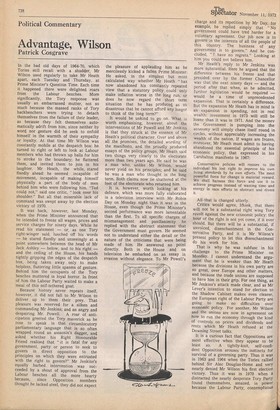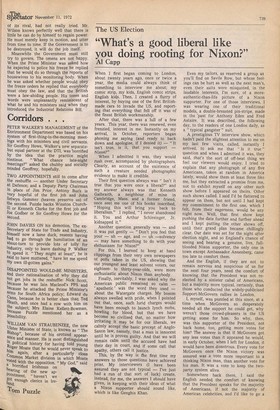Advantage, Wilson
Patrick Cosgrave
In the bad old days of 1964-70, which Tories still recall with a shudder, Mr Wilson used regularly to take Mr Heath apart, each Tuesday and Thursday, at Prime Minister's Question Time. Each time it happened there were delighted roars from the Labour benches. More significantly, the Tory response was usually an embarrassed mutter, not so much because the massed ranks of Tory backbenchers were trying to detach themselves from the failure of their leader, as because they felt themselves automatically adrift from him, since neither by word nor gesture did he seek to enfold himself in the warmth of their sympathy or loyalty. At that time Mr Wilson was constantly mobile at the despatch box: he turned to right or left to look at Labour members who had thrown up balls for him to stroke to the boundary; he flattered them, and invited them to join in his laughter. Mr Heath, the while, stared fixedly ahead: he seemed incapable of movement, incapable of making himself physically a part of the body of men behind him who were following him. "Ted could not," said one critic, 'look over his shoulder." But all that miserable lack of command was swept away by the election victory of 1970.
It was back, however, last Monday, when the Prime Minister announced that he intended to freeze all wages, prices and service charges for ninety days. While he read his statement — or, as one Tory right-winger said, lunched off his words — he stared fixedly and unseeingly at a point somewhere between the head of Mr Jack Ashley — below, and to his right — and the ceiling of the House, his hands tightly gripping the edges of the despatch box, being taken away only to make helpless, fluttering little spasms of gesture. Behind him the occupants of the Tory benches muttered in loyal horror. In front of him the Labour Party waited to make a meal of this self-tethered goat.
Because history never repeats itself, however, it did not fall to Mr Wilson to deliver up to them their prey. That pleasure was reserved for a silken and commanding Mr Jenkins; and an angry and despairing Mr. Powell. A roar of anticipation greeted the Tory maverick as he rose to speak in that circumlocutory parliamentary language that is so often wrapped round an assassin's dagger, and asked whether his Right Honourable Friend realised that "it is fatal for any government, party or person to seek to govern in direct opposition to the principles on which they were entrusted with the right to govern?" Mr Jenkins's equally barbed intervention was succeeded by a shout of approval from the Labour benches all the more hearty because, since Opposition members thought he lacked steel, they did not expect
the pleasure of applauding him as he mercilessly kicked a fallen Prime Minister. He asked, in the simplest but most calculated way whether Mr Heath " has now abandoned his constantly repeated view that a statutory policy could only make inflation worse in the long run, or does he now regard the short term situation that he has produced as so disastrous that he cannot afford any longer to think of the long term?"
It would be unkind to go on. What is worth emphasising, however, about the interventions of Mr Powell and Mr Jenkins is that they struck at the essence of Mr Heath's political character. Over and above all the promises, the detailed wording of the manifesto, and the proudly produced. essays of the policy groups, Mr Heath said two things very clearly to the electorate more than two years ago. He said he was a man who, unlike Mr Wilson, would never yield on his principles; and he said he was a man who thought in the long term. Both claims now lie shattered at the feet of the electorate who returned him.
It is, however, worth looking at his defence, which was more fully elaborated in a television interview with Mr Robin Day on Monday night than it was in the House, even though the Prime Minister's second performance was more lamentable than the first. To all specific charges of mismanagement and pusillanimity he replied with the abstract statement that the Government must govern. He seemed not to understand either the detail or the nature of the criticisms that were being made of him. He answered no point directly. Both in the House and on television he embarked on an essay in evasion without elegance. To Mr Powell's charge and its repetition by Mr Day, for example, he replied simply that "No government could have tred harder for a voluntary agreement. Our job now is to govern in the interests of all the people of this country. The business of any government is to govern." And he concluded, " J have no regrets." Looking at him you could not believe him.
Mr Heath's reply to Mr Jenkins was more substantial. Here he argued that the difference between his freeze and that presided over by the former Chancellor was that the next ninety days — and the period after that when, as he admitted, further legislation would be required — would be a time of unprecedented expansion. That is certainly a difference. But the expansion Mr Heath has in mind is an expansion in spending, not in real wealth: investment in 1973 will still be lower than it was in 1971. And the money the Government is pumping into the economy will simply chase itself round in circles, without appreciably increasing the wealth of the nation. If wages are frozen, moreover, Mr Heath must admit to having abandoned the essential principle of his economic policy, that expressed in his Carshalton manifesto in 1967:
Conservative policies will restore to the individual his lost right to improve his own living standards by hs own efforts. The most powerful force for change is material reward. We shall harness this force and use it to achieve progress instead of wasting time and energy in vain efforts to obstruct and divert it.
All, that is changed utterly.
Critics would agree, lenink, that there will not be a substantial right wing Tory revolt against the new economic policy: the hour of the right is not yet come, if it ever should. But there will be a substantial, if unvoiced, disenchantment in the Conservative Party, and it is Mr Wilson's present policy to let this disenchantment do his work for him.
That is why he was subfusc in his challenge to the Prime Minister on Monday. I cannot understand the argument that he is weaker than Mr Heath because the divisions in his own party are so great, over Europe and other matters, and because the trade unions are supposed to have him in their grip. For one thing, as Mr Jenkins's attack made clear, and as Mr Lever's intention to stand for election to the Shadow Cabinet makes even clearer, the European right of the Labour Party are going to make no difficulties over economic policy. For another, Mr Wilson and the unions are now in agreement on how to run the economy through the kind of controls on prices and dividends and rents which Mr Heath refused at the Downing Street talks.
It is a curious fact that Oppositions are most effective when they appear to be least so. A tightly-knit, self-confident Opposition arouses the instincts for survival of a governing party. Thus it was in 1963 and 1964 when the Tories rallied behind Sir Alec Douglas-Home and very nearly denied Mr Wilson his first election victory. Thus it was in 1970 when a distracted the nearly desperate Tory Party
found themsmelves, amazed, in power because the Labour Party, contemptuous
of its rival, had not really tried. Mr. Wilson knows perfectly well that there is little he can do by himself to regain power. He must merely keep in motion, and utter from time to time. If the Government is to be destroyed, it will do the job itself. Meanwhile the Government must still try to govern. The omens are not happy. When the Prime Minister was asked how he expected to police his freeze he replied that he would, do so through the reports of housewives to his monitoring body. When he was asked whether people would obey the freeze orders he replied that everybody must obey the law, and that the British were a law-abiding people. His tones and words were unpleasantly reminiscent of what he and his ministers said when they introduced the Industrial Relations Bill.
Corridors . . .
PETER WALKER'S MANAGEMENT of the Environment Department was based on his System of first-thing-in-the-morning meetings with his ministers and civil servants. Sir Geoffrey Howe, Walker's new separatebut equal partner at the DTI, was horrified by the idea that the practice might continue. "What chance late-night Meetings?" asked the chubby and socially minded Geoffrey, hopefully.
TWO APPOINTMENTS still to come after the reshuffle — another Under Secretary at Defence; and a Deputy Party Chairman In place of Jim Prior, Antony Buck is very hopeful of the first job and John Selwyn Gummer (heaven preserve us) of the second. Puzzle backs Winston Churchill or Kenneth Clarke for the first job and Joe Godber or Sir Geoffrey Howe for the second.
JOHN DAVIES ON his demotion. The exSecretary of State for Trade and Industry, himself now a lame duck, resents having had to go through the humiliation of an about-turn to provide lots of lolly for industry, only to leave dashing P. Walker to spend it. " They might at least", he is said to have muttered, "have let me spend nly own ill-gotten gains."
DISAPPOINTED WOULD-BE MINISTERS, and their rationalisation of why they did not get jobs in the reshuffle: Nick Scott, because he was lain Macleod's PPS and because he attacked the Prime Minister's arms for South Africa policy; Edward du Cann, because he is better class than Ted, Heath, and once had a row with him on the subject; Mrs Elaine Kellett-Bowman, because Puzzle mentioned her as a Possibility.
WILLIAM VAN STRAUBENZEE, the new Ulster Minister of State, is known as "The thshop", because of his orotund appeara. nee and manner. He is most distinguished In political history for having told young Roger Moate that he would never speak to again, after a particularly close Common Market division in which Moate voted with the opposition. "My God," said a horrified Irishman on
hearing of the new ap Pointment, "haven't we .
,got enough clerics in Ireland.
Prom Puzzle



















































 Previous page
Previous page